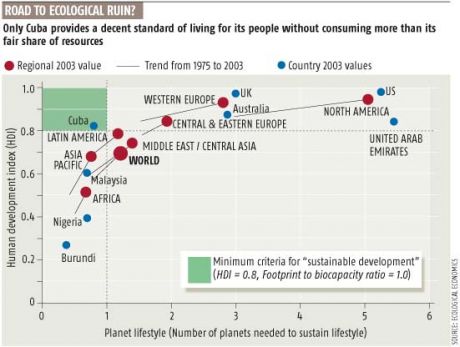Cuba Flies Lone Flag for Sustainability
 international |
environment |
other press
international |
environment |
other press  Thursday October 11, 2007 23:10
Thursday October 11, 2007 23:10 by Tech1.0
by Tech1.0
According to a new study on ecological sustainablity published in New Scientist, Cuba is showing the way on life in a post-oil world.
(from last week's New Scientist - I'm publishing this in the inter-national public interest...)
"We don’t need environmental evangelicals to tell us that sustainable development is a good idea. Yet, if that is our goal, we are heading in the wrong direction - with the exception of Cuba. So says the first study to examine the ecological impact of changing lifestyles around the globe.
We don’t need environmental evangelicals to tell us that sustainable development is a good idea. Yet, if that is our goal, we are heading in the wrong direction - with the exception of Cuba. So says the first study to examine the ecological impact of changing lifestyles around the globe.
An international team led by Mathis Wackernagel of the Global Footprint Network looked at how the living conditions and ecological footprints of 93 nations have changed in the last 30 years.
They used the ecological footprint (EF) index, a tool devised in 1993 by Wackernagel and William Rees, his PhD supervisor at the University of British Columbia, Canada. EF quantifies the area of land required to provide the infrastructure used by a person or a nation, the food and goods they consume, and to reabsorb the waste they produce, using available technology. This value can then be compared with the resources that are actually available to people on a regional or global scale. EF has become a popular index, and was used recently, for example, by conservation group WWF to calculate that two more planets would be needed to support everyone in the world in the manner of the average UK citizen.
However, rather than just measure consumption, Wackernagel and his colleagues wanted to measure how close countries are to developing in a sustainable way. The problem is that “sustainability” is an elusive concept. “Nobody dares to say what it actually means,” Wackernagel told New Scientist. “We believe we provided a robust measurement.”
For each nation with reliable data, they calculated how many planets would be needed to support the global population if everybody adopted that nation’s lifestyle as it was in 1978, and in 2003. They then expressed each figure as an Earth-equivalent ratio (EER) and plotted each value against the nation’s corresponding UN Human Development Index. The index is a score of between 0 and 1, and is a function of a country’s average life expectancy, adult literacy, level of schooling and per capita GDP.
To develop sustainably, the researchers assume a country must have an HDI of at least 0.8 and a maximum EER of 1 (see Diagram). A lower HDI would mean a nation is not developing adequately, while a higher EER means it is gobbling up too many resources.
By looking at each country’s historical trajectory, a clear pattern emerges. People everywhere have a better lifestyle, but their footprint is growing at a rate proportional to their wealth. Developed countries in particular have done very little to reduce their impact. Only one nation, Cuba, is developing sustainably, and probably not for long (Ecological Economics, DOI: 10.1016/j.ecolecon.2007.08.017). “Cubans have high life expectancy and literacy, and were forced into a smaller footprint because of the oil embargo,” says Wackernagel. “But they are now economically more successful, and will tend to use more resources.”
Critics point out that EF calculations do not take into account issues such as pollution from certain toxic chemicals, and place too much reliance on others, such as carbon footprints, which may be alleviated by the invention of new technologies. Even so, “it’s a broad indicator of the direction things are moving, and it’s an excellent tool for communicating to the public and decision makers,” says Jan Vernon, who reviewed the validity of EF for the UK government.
The study, therefore, carries a credible message: we have all moved away from sustainability, and the world has entered ecological overshoot. “We have not taken sustainable development seriously,” Wackernagel concludes.
"
New Scientist link
http://tinyurl.com/3bdju5
http://www.footprintnetwork.org/index.php
http://www.wwf.org.uk/researcher/issues/footprint/index.asp
http://en.wikipedia.org/wiki/Human_Development_Index
Measuring sustainable development — Nation by nation (sciencedirect)
http://dx.doi.org/10.1016/j.ecolecon.2007.08.017
and for more on this theme check out the fascinating documentary below,
The Power of Community: How Cuba Survived Peak Oil
http://www.powerofcommunity.org/cm/index.php
http://globalpublicmedia.com/articles/657
